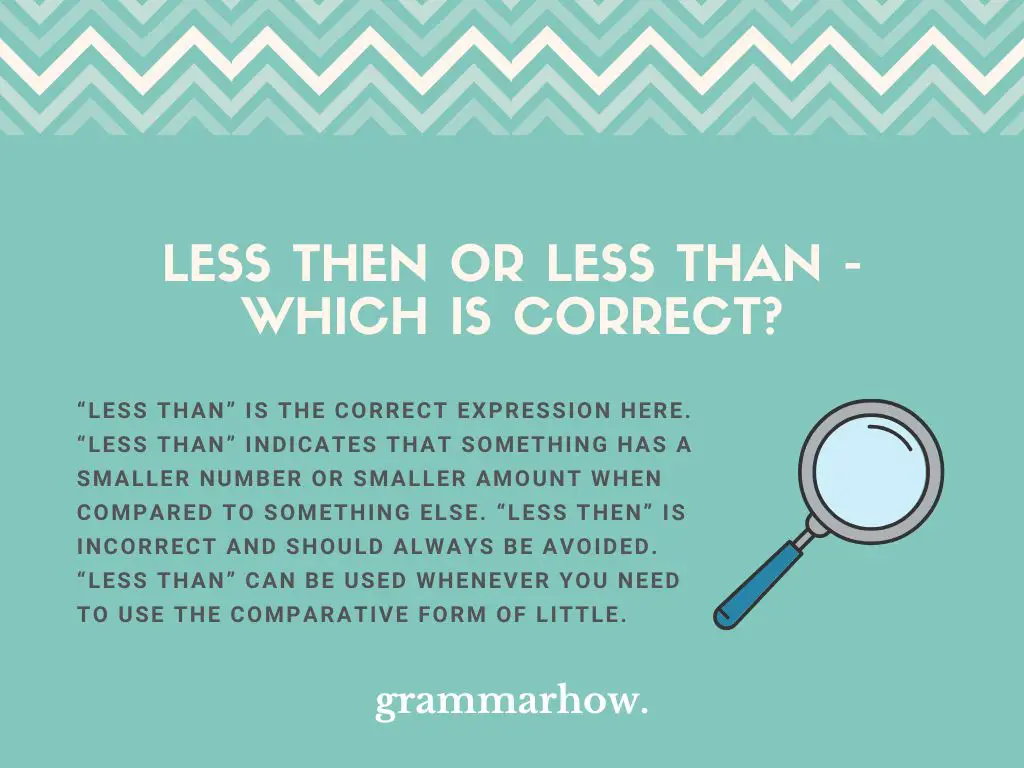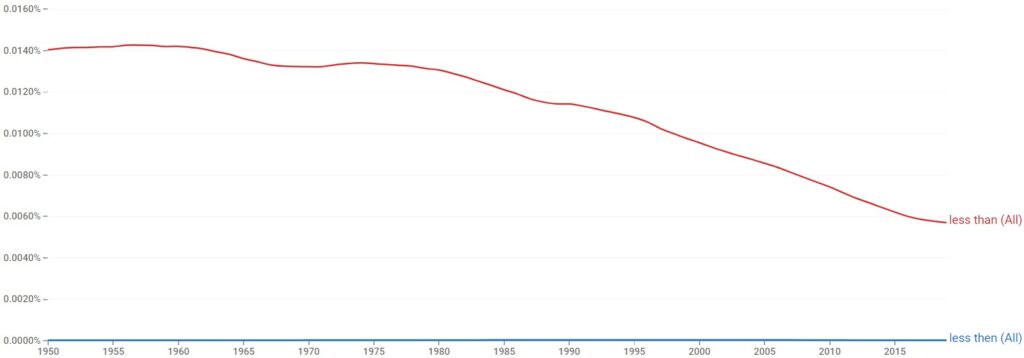What is the correct form, when we compare “Less Then” and “Less Than”?
We want to know which is the correct form and which one to avoid. We also what to know what’s the correct definition of the phrase, as well as the appropriate usage for it.
Let’s find out!
Less Then or Less Than – Which Is Correct?
“Less Than” is the correct expression here. “Less Than” indicates that something has a smaller number or smaller amount when compared to something else. “Less Then” is incorrect and should always be avoided. “Less Than” can be used whenever you need to use the comparative form of little.

Take a look at the examples below:
- Ashley has less fruit then Jacob. (incorrect)
- Ashley has less fruit than Jacob.
“Less Then” and “Less Than” aren’t synonyms, and cannot interchange. In this situation, one is correct and the other one is wrong. There isn’t much way around it, because it’s a straightforward right or wrong situation.
The examples show two equal sentences, except that one uses “Less Then” and the other uses “Less Than”. The version using “Less Then” is incorrect, and you should avoid this form.
The correct sentence uses “Less Than”.
Less Then
“Then” is an adverb that indicates time, and means “at the time” or, in some instances, “after that”. There’s no way to reconcile the meaning of “Less”, which is the comparative of little in terms of amount, with “Then”. Those words simply don’t make sense together. “Less Then” is incorrect.
Take a look at some examples that show “Less Then” being incorrectly used, followed by a corrected sentence that uses the phrase “Less Than”:
- When sharing with your sister, make sure she doesn’t have less then you. (incorrect)
- When sharing with your sister, make sure she doesn’t have less than you.
- Theresa brought less money then me. (incorrect)
- Theresa brought less money than me.
- This assignment needs to be turned in in less then 24 hours. (incorrect)
- This assignment needs to be turned in in less than 24 hours.
“Less Then” is a common misspelling of “Less Than”, the uses and “e” instead of an “a”. It’s not a huge mistake, and most of us could have a type here and there. However, the change of a small letter completely shifts the meaning of the phrase and makes it incorrect.
Now that you know what’s the correct form, always try to avoid using the incorrect form.
Less Than
“Less Than” is the correct phrase to indicate something (or someone) has a lesser amount of something when compared to another one. “Than” is a conjunction that joins two parts of a comparison. When used together with “Less” the comparison is about who has a smaller or a larger amount.
Take a look at some very good examples below:
- You have less than a week to finish this project.
- Mariana has less motivation than Hank and needs to improve it.
- The construction should be completed in less than a month.
- This house has less natural light than the last.
- Team A has less game plan than team B.
“Less Than” is meant to indicate a fewer quantity in comparison when related to the number, or amount, of things. The comparative form for the word “Little” varies depending on what is being described.
Which Is Used the Most?
Which one of those forms is used more often, “Less Then” or “Less Than”? Take a look at the graph from Google Ngram Viewer below.

Usually, when comparing correct and incorrect alternates of the same phrase, we have an idea of what to expect from the graph. As we imagined it’d be the case, “Less Than” is the prevalent form that appears at the top of the graph as the most used one.
“Less Then”, the incorrect alternate, barely appears at the bottom of the graph.
Final Thoughts
“Less Than” is a grammatically correct and acceptable phrase, that indicates that something (or someone) has a lesser amount when compared to a similar thing. “Less Then” is an incorrect form for this phrase and, as with any unacceptable form, it should be avoided.

Martin holds a Master’s degree in Finance and International Business. He has six years of experience in professional communication with clients, executives, and colleagues. Furthermore, he has teaching experience from Aarhus University. Martin has been featured as an expert in communication and teaching on Forbes and Shopify. Read more about Martin here.

